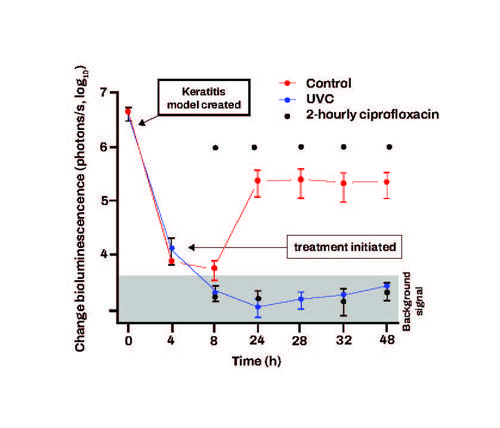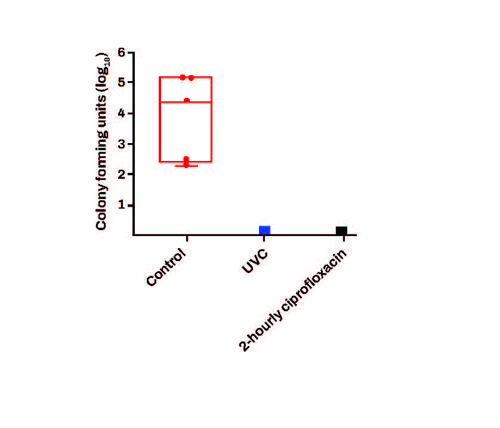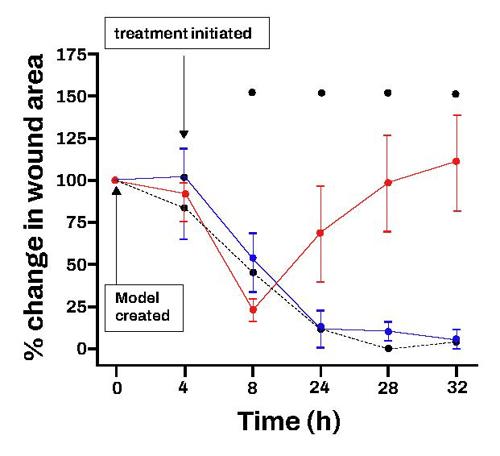Cornea, Corneal Therapeutics
Ray of a New Dawn in Corneal Infection Research
Will UVC light the way as a potential treatment for microbial keratitis?

Dermot McGrath
Published: Monday, June 3, 2024
“ It is still early days, but preclinical studies of low-dose UVC in vitro, ex vivo, and in vivo have shown promising results regarding safety and efficacy. “
A novel treatment using ultraviolet-C (UVC) light developed by Photon Therapeutics Ltd shows promise as a potentially safe and effective alternative to existing treatments for microbial keratitis, according to Detlev Holland MD.
“It is still early days, but preclinical studies of low-dose UVC in vitro, ex vivo, and in vivo have shown promising results regarding safety and efficacy. It is fast and non-invasive and can be performed at the slit lamp,” he said. “If we have a treatment that can be used directly, which is quick and without complications, it could be really helpful in patients with corneal infections.”

Corneal infections are one of the leading causes of blindness worldwide, with patients suffering from a wide range of complications, Dr Holland noted.
“There is also the issue of increasing resistance worldwide to antibiotics, which is driving the search for new therapies,” he said. “UVC is directly targeted on the microbial DNA, so there is no resistance to this treatment.”
Ultraviolet light has different wavelengths from 100 to 400 nm and is commonly divided into three bands: UVA (400 to 315 nm), UVB (315 to 280 nm), and UVC (280 to 100 nm).
“UVC is of particular interest as it is ‘germicidal’ and known to have efficacy against a range of microorganisms, including bacteria, viruses, fungi, and protozoa,” Dr Holland explained.
For the in-vitro tests, a range of bacteria—staphylococcus aureus, Escherichia coli, Pseudomonas aeruginosa, and streptococcus pyogenes—were exposed to a 4.5 mm diameter 265 nm beam at a fixed intensity and distance of 8.0 mm for 1, 2, and 4 seconds.
“It was shown that as little as one second of UVC exposure had an anti-microbial effect. The density of growth inhibition increased with exposure time—and the highest efficacy in this test demonstrated for Pseudomonas aeruginosa and the least efficacy for E coli,” he said.
To evaluate the safety of UVC exposure at bactericidal doses, the team exposed confluent monolayers of primary culture of human corneal cells to UVC for 1, 2, 4, 5, 10, or 30 seconds. A live/dead cytotoxicity assay was then performed to measure cell death and compared it with a non-treated control group.
“The dead/live ratio was the same for the treated group as in the control group,” he said. “Moreover, the exposure time did not change the cell death ratio. So, it seems relatively safe with no adverse effects on the human corneal epithelial cells.”
Dr Holland also presented results from in vivo tests on mice, showing that UVC light is comparable to antibiotic treatment in reducing infection.
“The UVC light was comparable to the treatment eyes, which were treated with antibiotics,” he said. “A two-time application of 15-second UVC treatment was highly effective in managing P aeruginosa keratitis, with only 25% of mice requiring a second dose.”
Although further studies are needed to assess the safety and efficacy of UVC in human eyes, Dr Holland noted the treatment may help to answer an unmet need in treating corneal infections.
“New treatment options could be very helpful,” he concluded. “Sometimes, when we have a patient with keratitis—and we don’t know exactly which bacteria we are dealing with—corneal scraping and lab tests can take 24 to 72 hours to yield results, prolonging the patient’s journey to treatment. UVC light therapy gives a potential empiric rapid and safe way to address these infections as it is effective against all microbes.”



Dr Holland presented at the 2024 ESCRS Winter Meeting in Frankfurt.
Detlev Holland MD is a cataract and refractive surgeon at Augenzentrum.ONE, Kiel, Germany. He is a shareholder in Photon Therapeutics Ltd. holland@augenzentrum.one